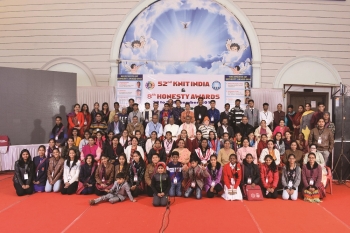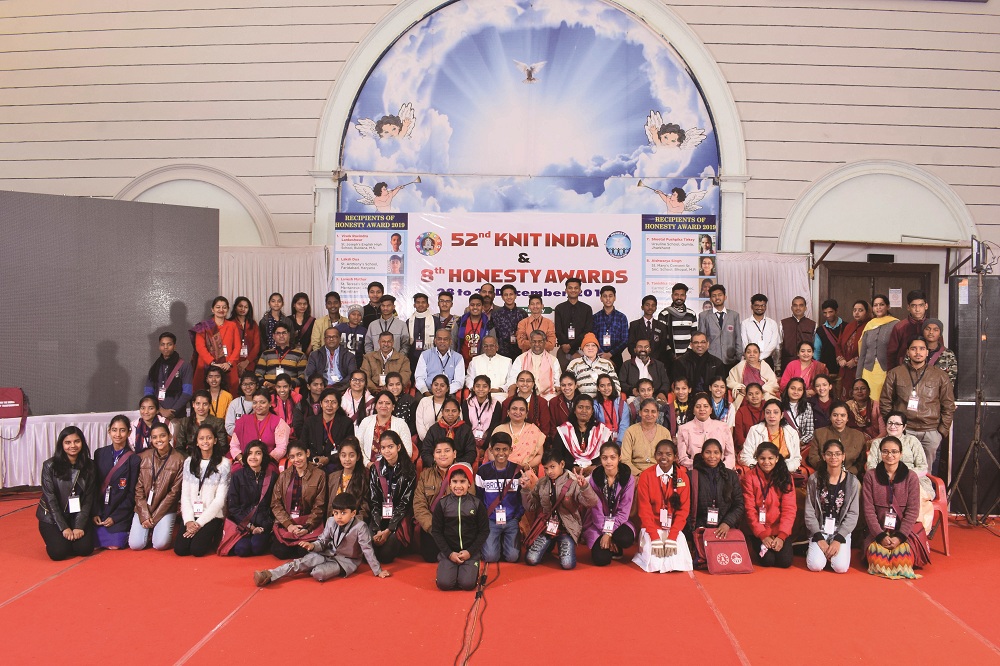
.png) Varghese Alengaden
Varghese Alengaden

When Prime Minister Narendra Modi gave a call for a Bharat Jodo Andolan as India enters the 75th year of independence, I thought of the foundation of Universal Solidarity Movement of Value Education for Peace and Knit India which had the above motto as one of its ten-point action plan in 1993. The yearly gathering of young students, teachers and principals was named KNIT INDIA. Another action plan which the Movement had been promoting since its inception was CLEAN INDIA (Swatch Bharat) which Modi had made his pet project after he took over as Prime Minister.
Many years ago Baba Amte had launched Bharat Jodo, Knit India movement to promote unity and communal harmony. He had organized an all-India tour with many young people and social activists. Veteran Gandhian Dr. Subha Rao also had organized Bharat Jodo, Knit India tour of India to promote communal harmony and peace.
Unity in diversity was the unique characteristic of India for ages. It is a unique gift of God for India. Despite diversity of religions, castes, languages, dialects, cultures, colours, food habits, geography and climatic conditions, people of India lived in unity and harmony. Pluralism of acceptance, appreciation and promotion of diversity was the DNA of India.
With all diversity Indians were united in their struggle for independence from the British slavery. What has prompted the Prime Minster to call for unity when India enters the 75th year of her independence? This call for unity is necessitated because of division and disintegration prevalent in the country. Sacred heritage of unity in diversity was threatened much before independence. Partition of India happened partly because of the ‘divide and rule’ policy of the British and partly because of lack of vision of the political leaders. They, except a few leaders like Mahatma Gandhi, failed to safeguard unity in diversity.
Partition of the country and independence resulted in terrible communal violence and massacre of thousands of innocent people. Hatred, revenge, mistrust and communal polarization, which resulted from the partition of the country, haven’t ended even today. A vast majority of politicians, instead of uniting people, continue to divide them for their vote bank politics. Communal violence has become part of independent India. Divisive politics continues in the name of religion, caste, region and language.
Religious leaders who are expected to guide people to live in peace and harmony have failed in their sacred mission. They too have joined hands with politicians to divide people and spread hatred and prejudice to establish their empire. Politicisation and commercialisation of religion have become a disaster for this nation where people are drugged with the ‘opium’ of religion. Teachings of sacred scriptures, democracy, and universal spiritual values enshrined in the Constitution are violated by the very same people who are expected to protect them.
Realizing the urgency of restoring the soul of India, the sacred heritage of unity in diversity, Universal Solidarity Movement (USM) was launched in 1993. Communal violence and murder of thousands of innocent people across the country after the demolition of Babri Masjid in Ayodhya prompted the foundation of USM with the purpose of preserving the unity and integrity of the nation and fellowship and friendship among people of all faiths and walks of life. Bharat Jodo (Knit India) was one of the focus areas of the Movement.
From the inception of the movement, we are committed to live ‘Bharat Jodo’ as a way of life by practicing what is preached. USM is a Movement with people of all faiths and walks of life. We ensure the practice of pluralism at every level. The seven-member Governing Body consists of members from three different religions. USM community which consists of persons from diverse religious and cultural background bears witness to Bharat Jodo, Knit India. The Annual General Body meeting is an open house where members, friends, well-wishers and strangers are welcomed. Total transparency and inclusive participation of all people are essential for promoting unity.
The way of life and mission of USM community prove the effectiveness of unity in diversity. People of all faiths and walks of life pray together reading and reflecting sacred scriptures of all religions and celebrating different festivals. Pictures of saints and gods of all faiths are displayed on the walls of the community. People of all faith and status share the meals on the same table. The young and adults who come from all parts of India get convinced of the rich heritage of unity in diversity. They resolve to restore the soul of India by breaking down the walls of religion, caste, nationality and other differences. To be true to its commitment to pluralism which should work for universal solidarity, the Movement has formulated a vision for its mission:
We visualize a nation/world with the universal family spirit of Hinduism and Baha'I faith, the discipline and fellowship of Islam, the courage of Sikhism, the compassion of Buddhism, the non-violence of Jainism, the creativity of Parsi religion, the indomitability of Judaism, the cosmic solidarity of tribal religions, the self-sacrifice and forgiveness of Christianity.
By shouting slogans of ‘Bharat Jodo’, ‘Bharat Mata ki Jay’ and eloquent talks, unity and integrity of the nation cannot be realized. Political leaders, religious preachers and every citizen shall make these slogans and preaching a way of life.
It is fitting to recall what Narendra Modi said in his Independence Day speech from the ramparts of Red Fort on August 15, 2015, “We want a ten-year moratorium on the politics of violence and hate”. Giving the slogan “sabka Saath, Sabka Vikas” he said: “Believe in my words, I do assure you. Shun all the sins committed so far, give up that way, follow the way of good will and brotherhood, and let us resolve to take the country forward. I believe that we can do”.
But the big question to be answered is, what did Modi do during the past seven years as Prime Minister to achieve his dream? As all his slogans of the past, will Bharat Jodo slogan also remain a mere political rhetoric? Will he show his political will and sincerity to unite the 1.3 billion people by ensuring justice, equality, freedom, democracy, fraternity and dignity of individual? Will he correct the mistakes committed in the past? The slogan of RSS-BJP, “Hindu, Hindi, Hindustan’ is contrary to “Bharat Jodo”.
When the Universal Solidarity Movement was launched, it had prepared a module of Five Paths for personal transformation. They are:
1. Pray daily for peace according to one’s religious tradition and work for reconciliation.
2. Do a good deed a day without selfish motive.
3. Skip a meal to express solidarity with the poor and the marginalized and use it for helping someone in need.
4. Honour parents, teachers and all human beings.
5. Respect the earth and save its resources.
Without personal transformation no social transformation is possible. Sincere practice of these five paths is mandatory to be a member of USM. Practice of these modules has brought transformation of young people and adults.
The Knit India, Bharat Jodo, action program which Universal Solidarity Movement launched in 1993 is more relevant and urgent today when the country is going through a difficult time of communal polarization and aggressive nationalism of intolerance and hatred. The uniqueness of USM is that it has been loyal to the way of life it promotes. Universal solidarity and Bharat Jodo can be realized when each citizen takes charge and start doing his/her part. That is what USM had been doing since 1993. The experiment is proved successful. The need of the hour is to have more committed and competent volunteers who can inspire more and more people to work for peace and unity. Educational institutions shall make it their priority.